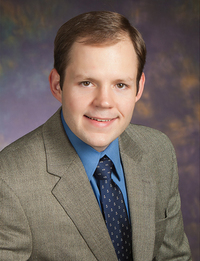Taylor T. Johnson, an assistant professor of computer science, computer engineering, and electrical engineering, has been recognized with an early career award from the Air Force Office of Scientific Research. He will receive a three-year grant to work on formal verification for cyber-physical systems (CPS) that is understandable and reusable.
The $450,000 grant is part of the AFOSR’s $19.1 million Young Investigator Research Program. The agency this year awarded research grants to 43 engineers and scientists “who show exceptional ability and promise for conducting basic research.”

Johnson and his lab, VeriVITAL – the Verification and Validation for Intelligent and Trustworthy Autonomy Laboratory in Vanderbilt’s Institute for Software Integrated Systems, focus on developing formal verification techniques and software tools for CPS, with goals of improving safety, reliability, and security in the fast-growing Internet of Things. This includes developing foundational approaches and applying techniques and tools from a wide range of fields, including hybrid systems, formal methods, control theory, software engineering, distributed systems, and real-time systems.
“I am grateful and humbled to be recognized for our proposed research to improve software and systems engineering for cyber-physical systems,” Johnson said. “The vast majority of personnel and cost resources in the engineering process for CPS are used in the verification and validation (V&V) process, with upwards of 80-90 percent of resources used for V&V in aerospace and defense systems.
“Through our project, we aim to improve the V&V process to increase its efficiency, with a broader vision of ensuring safe, secure, and reliable CPS.”
Johnson has a long-running collaboration with the Air Force through Air Force Research Laboratory (AFRL) and AFOSR projects and programs. He has made multiple visits to the research facilities, and both he and VeriVITAL have been supported by an AFRL research contract and two other AFOSR research grants.
As a faculty member, he participated in AFRL’s 2017 Summer of Innovation program to develop verification methods for autonomous systems in Dayton, OH, in conjunction with the Wright Brothers Institute and agency’s Air Vehicles Directorate at Wright-Patterson Air Force Base.
He has worked with the research lab’s Information Directorate in Rome, NY, two times – as an AFOSR Summer Faculty Fellowship Program participant over summer 2015 and as part of the lab’s Visiting Faculty Research Program (VFRP) over summer 2014. Additionally, he has researched with AFRL’s Space Vehicles Directorate in at Kirtland Air Force Base in Albuquerque, NM.
He joined the School of Engineering faculty in 2016 and has published more than 50 papers on formal software verification methods and their applications across the aerospace, automotive, power and energy systems, transportation, and robotics sectors. Several of these papers have received best paper awards, and Johnson and his collaborators were also recognized with an Association of Computing Machinery (ACM) best software repeatability evaluation award in 2016.
Johnson previously received a 2015 NSF Computer and Information Science and Engineering (CISE) Research Initiation Initiative (CRII) award.